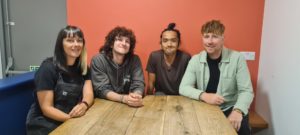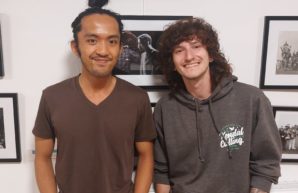MM Mentorship completed by two more musicians
Posted by Darren Leadsom on 20 September 2023
Two young musicians have completed the More Music Mentorship Scheme, gaining experience and new skills as emerging music leaders and freelance arts practitioners. Tom Mulliner and Aison Clark have been a part of the mentorship since December 2022 and were selected through an open application process in November 2022.
Singer-songwriter Aison is an international student from Hong Kong and is studying for a social work degree at Lancaster University.
Tom was a participant at More Music when he was at school and is now is a guitarist and songwriter in local bands, performing recently at Kendal Calling, alongside a career in retail.
This is the third year of the More Music Mentorship, funded by Youth Music (read about our first and second mentorship cohorts). The aim of the scheme is to provide a structured programme of shadowing, mentoring and training over an 8 to 9-month period. This offers mentees an overview of our diverse in-house programme and provides a hand-on insight into community music practice and life as a freelance music leader.
Tom and Aison were each supported by members of our core music leader team, who identified their particular interests and skills and arranged a timetable for shadowing sessions across our weekly programme and provided pastoral and professional support throughout. The wide-ranging learning opportunities included music making activities for early years, SEND, young people and adults, exploring many different musical genres and styles of delivery.
A bursary is provided to help reduce any financial barrier to participation and contribute to any costs incurred. They were mentored by music leaders Rachel Parsons and Ash Murphy.
I interviewed Aison and Tom to find out more about their mentorship experience and what they have gained from it.
Q: What has the mentorship experience been like for you?
Tom: It’s been a brilliant experience. Attending here so long ago and then going on to the other side as a music leader was a bit eye-opening really, probably a little overwhelming. It gives you a little bit of imposter syndrome at first but when you do loosen up and get used to it, it’s definitely rewarding. It puts it into a different perspective seeing sessions delivered well by music leaders in front of you. I already felt like, after a couple of examples, I was comfortable enough and ready to lead a session myself for example.
Aison: I think the mentorship put me out of my comfort zone a lot and pushed me to be more proactive in communicating with more people. I learned that you need to use different approaches to communicate with different people. For example: you may need to simply listen more when interacting with elderly people whereas, for younger people, you may need to be more proactive to communicate. Moreover, when communicating with children, being proactive may not be enough as we might need to consider different approaches depending on whether they are younger or older.

Tom and Aison with mentors Rachel Parsons (far left) and Ash Murphy (far right)
Q: Do you think having the opportunity to observe and participate in a variety of sessions was helpful to you?
Tom: Definitely with the variety, you get to see all the different examples of leading sessions with a variety of age groups. You see how it can be incorporated into your own way of delivering sessions. One thing I love is that each individual leader, no matter how specific their style is, no matter what the session is, there is no right or wrong. It is about having fun and getting that first-hand experience with something you may not be accustomed to, which I found really enjoyable.
Aison: It definitely was. Just like Tom said, you get to see different ways in leading session depending on the age groups. One thing I find common among all the sessions was the importance of crowd interaction. What I mean by that is music leaders would often arrange certain parts for audience to actively participate in the sessions. For example: in Seagull café, Bill and Sian would do vocal warm-ups and singing activities with the elderly people where they would be divided in small groups and sing the same song but with different melodies. Or, with the music technology session that I shadowed Leroy, he would arrange some clapping activities with the children to demonstrate the idea of rhythm. I think this skill is useful not only for teaching, but also for performing and presenting where you could actively engage with your audience.
Q: What new skills do you think you have learned as a result of the mentorship?
Tom: Being able to communicate with different age groups is a big one, being able to direct a room, something that I definitely didn’t think I would be able to do. It just involves finding that common ground and being someone that people feel they can trust and look up to and have faith in. The good examples I saw in the mentorship were people who were delivering the sessions with a lot of confidence. I feel like if you show a little bit of nerves, like I did the first time I spoke to a group of kids, that’s when it can start to go a little pear shaped because you really do have to be direct but stay as calm as you can be. As long as it’s been since my last session, I am looking forward to the next one now because I feel ready for it.
Aison: I think listening as well. For example, when we do Stages, sometimes we work with an individual and we listen to what they want with their songs. That’s where we do what we can with our knowledge to help them achieve the sound that they want. Other than listening, I would also say I have been more proactive in reaching out to people to collaborate, such as asking Tom to be part of my band performance. Another important skill I learnt was on how to teach by simplifying steps and establishing a rule of thumb to build a basis for the whole activity. I also learnt about navigating the music community through identifying who you can reach out to, who you can collaborate with, and the venues and facilities you can use.
Q: Has there been a particular highlight of the mentorship for you?
Aison: For me, my personal highlight has been meeting the previous mentees because I have also been having imposter syndrome as I didn’t know anyone in the area. What I liked about meeting those mentees was that they are so enthusiastic about what they are doing and so welcoming talking to newcomers. One of them taught me the essential of having fun in leading a session. Yes, having fun is something I needed to learn. I remember being very nervous when I was given the opportunity to lead a session. I was worried about messing up and being boring. Fortunately, in addition to the help of my mentors (Rachel and Ash), one of the participants (who was one of the past mentees) in the session supported me to lead and they were having fun doing it. And, before I know it, I was also having fun without realizing that I am actually leading the session! That kind of support was almost like in the Last Airbender series when the past incarnation of the Avatar reached out to help out the present Avatar! Anyway, their positive attitude towards me also inspired me to be more proactive and communicative when meeting people.
Tom: One highlight for me was an interaction at a Stages session, I was helping one individual with their songwriting. At first you think this could be really tough and tricky but then it can be something you say that eventually clicks with them. Going into sessions for the next few weeks after that, seeing that progression and eventually hearing the completed song played back in the studio, that was something I wouldn’t have expected and was really nice. I felt grateful as well as they had shared that with me and I tried to offer as much help and guidance as I could. I didn’t want to put too much of my own input into the song so being able to listen back to it with the little suggestions I made included and for them to say ‘I love this and that’s how it should be’ made me feel like I was doing something right.
Q. What are the next steps for you both after the mentorship?
Tom: As I’ve said, I would have been happy just volunteering and I was quite surprised that this was a mentorship that I could take part in and be involved with for quite a long time. I would be quite happy to continue to help out with the sessions and maybe generate something myself or collaborate with others to try and bring something fresh in, maybe with songwriting because that’s my passion. I’m really grateful to have been part of such a fantastic opportunity with the mentorship. There is definitely a family feel here.
Aison: The next step for me is that I am doing the Good Things Collective Internship, so with that I am expanding my experience in community-based collaboration. I will also be having my 100-day placement coming up for my course, where I can use the various communication skills learnt from this experience. During this mentorship scheme, I have met a lot of enthusiastic people who have inspired me to work more on my own stuff and write my own songs again. I’m going to keep seeking for performing opportunities and keep in touch with everyone I have met. And, more importantly, I would still hope to get involved with More Music as long my schedule allows it. It’s been really cool to immerse myself in this community. Everyone here is very welcoming. Even though I have just been here for half a year, it feels like I have been here for 10 years!
The More Music Mentorship will be open to new mentees later in the year, check our website for updates and information.
